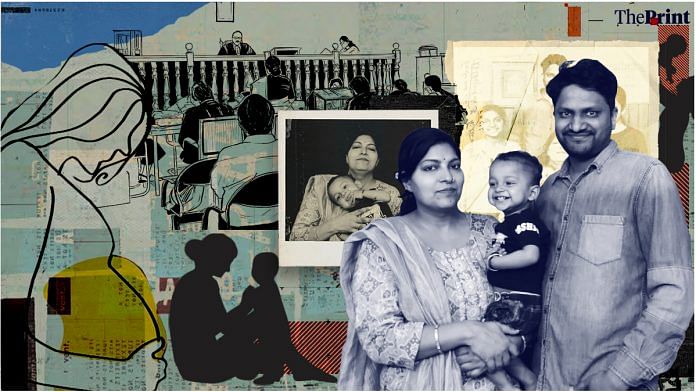The Uttarakhand Uniform Civil Code does next to nothing to end discriminatory and exclusionary practices in family law as far as parents and children are concerned. It discriminates between the parents of a child on matters of guardianship, does not provide equal rights to children born outside marriage, and fails to reform the outdated Hindu law on adoption.
We explain why the UUCC misses a great opportunity for reform in these areas and continues to maintain an unhappy status quo.
Missed opportunity to abolish illegitimacy
Under Indian personal laws, all children born outside marriage are deemed ‘illegitimate’. These children do not have the same set of inheritance or maintenance rights as compared to those born to married couples. They are therefore stigmatised due to the nature of the relationship between their parents; something they have no control over.
The UUCC does take a small step in the right direction to address this. It provides that children born out of void and voidable marriages and in live-in relationships will be ‘legitimate’ and thus treated at par with children born to married couples. However, this provision is based on the condition that the parents are either married or are in a relationship that mirrors marriage such as live-in relationships. Children born out of relationships that are not recognised by the UUCC continue to be ‘illegitimate’.
A modern law on parenthood should completely abolish the concept of illegitimacy as has been the case with most progressive jurisdictions in nations such as the United States and South Africa.
Even while recognising the legitimacy of children born out of live-in relationships, the UUCC is silent on issues of custody and maintenance of children in the event of separation of parents. Provisions relating to custody are only featured in Part I of the UUCC, which provides for the regulation of marriages and divorces, suggesting that custody proceedings will be relevant only in the event of dissolution of a valid marriage. The law is entirely silent about how custody issues and maintenance arrangements will be resolved if parents in a live-in relationship separate.
Also read: Uttarakhand UCC delivers status quo for wives & mothers, while promising ‘gender justice’
Guardianship and discrimination
As the UUCC is completely silent on parent-child relationships, existing personal laws on guardianship will prevail. All personal laws on guardianship continue to use the outdated concept of ‘guardian’ and ‘custodian’, where the former has the right to make decisions concerning the child and their property and the latter is responsible for caretaking. Guardianship as a concept is largely informed by the common law concept of ‘parental authority’ wherein fathers are vested with authority over their children’s lives. Most progressive jurisdictions have done away with guardianship as the basis for regulation of parent-child relations and have instead introduced laws where both parents are vested with rights to carry out their parental responsibilities. Such an approach provides that parents have rights (and not authority) only to ensure the welfare of the child.
Moreover, all personal laws on guardianship discriminate against women, as only fathers are guardians while mothers are mere custodians. It is only after the father (usually upon death or desertion) that the mother becomes the guardian. Both the Supreme Court and the legislature have not changed this position despite the Law Commission urging change. Similarly, under guardianship laws, mothers are guardians of children born outside marriage and fathers have no legal obligations to such children. Further, if the wife is a minor, it is the husband who is deemed to be her guardian. This renders minor wives vulnerable, as they are legally under their husband’s control. It is thus clear that despite marketing gender equality as its clarion call, the UUCC fails to deliver when it comes to guardianship.
Also read: Excluding STs from Uttarakhand UCC exposes a fundamental problem in its concept
Personal laws and adoption
The UUCC is silent on adoptions, which means the Hindu personal law on adoption, the Hindu Adoption and Maintenance Act 1956 (HAMA), will continue to be in force. The HAMA follows outdated norms in matters of adoption. For instance, a person cannot adopt a son if they already have a Hindu son, a grandson, or a great-grandson, and a person cannot adopt a daughter if they already have a Hindu daughter or a granddaughter. Such gender-based restrictions, while informed by religious principles concerning the role of the male child in the case of Hindu last rites, often end up defeating the purpose of adoption laws.
Similarly, adoptions under HAMA happen on the basis of the execution of a private deed with no institutional safeguards or oversight. Concerns have been raised about the misuse of such a process that can render the child vulnerable to exploitation. The UUCC could have ensured that the secular Juvenile Justice Act 2015, which governs adoptions for all religions and has rigorous safeguards to protect children, was the only applicable law in case of adoption. Instead, it allows the Hindu law to continue to operate. As argued here, this also goes to show that the UUCC is, in fact, not uniform in its application.
Guardianship laws are one of the most outdated facets of Indian family law and need to be rehauled to reflect a more contemporary approach to regulating parent-child relations. Regressive common law concepts such as parental authority, patriarchal family structure with the father as the head of the household, and children with limited agency should not inform law-making. The UUCC continues this norm, perpetuating gender-biased notions of parenthood and staying silent on the matter. It is not just a missed opportunity but an indication that family law reforms or gender equality was never the intent of this project.
Namrata Mukherjee is a Senior Resident Fellow at the Vidhi Centre for Legal Policy. Views are personal.
(Edited by Humra Laeeq)



